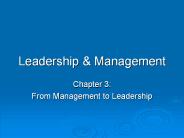Leadership - PowerPoint PPT Presentation
1 / 21
Title:
Leadership
Description:
Pragmatic, analytical, methodical, conscientious. Supervision ... Spruance known for methodically planned out Amphibious Battles. Introspection and Reflection ... – PowerPoint PPT presentation
Number of Views:163
Avg rating:3.0/5.0
Title: Leadership
1
Leadership Management
- Discussion for Lesson 11
- Personality and Reflection as a Leadership Tool
2
Lesson 11Reading Objectives
- 1. The student will comprehend and
distinguish personality traits and psychological
types. - 2. The student will know his/her
psychological type and describe the implications
for his/her relationships and leadership
performance. - 3. The student will comprehend why
introspection and reflection are valuable tools
for a leader.
3
Lesson 11Reading Objectives
- 4. The student will comprehend the Paul
Principle and how to avoid it. - 5. The student will apply reflection and
introspection to better understand their
strengths and weaknesses as a leader.
4
Lesson 11Discussion Objectives
- 1. The student will know their psychological
type and describe the implications for their
relationships and leadership performance. - 2. The student will apply reflection and
introspection to better understand their
strengths and weaknesses as a leader.
5
REVIEW OF FIRST PAPER
- this and that
- Thesis statement/summary
- The written medium doesnt talk
- speaks to ?
- Introduce your sources.
- Footnotes and Quotation marks
- Reread and Rewrite
- Multiple use of the same word
- Pronoun mismanagement
- Missed words
- Useful resources
- http//www.bartleby.com/141/index.html Elements
of Style, Strunk - http//www.wsu.edu8080/brians/errors/errors.html
Common Errors in English.
6
Personality Structure
- Extroversion
- Agreeableness
- Conscientiousness
- Emotional Stability
- Openness to experience
- Self-monitoring of Behavior
7
Psychological Types
- Psychological types help define cognitive styles,
i.e., mental processes used to perceive and make
judgments from information - Knowledge of these cognitive styles can help you
relate better to people because you better
appreciate how they make decisions - According to Psychiatrist Carl Jung, how people
gather and evaluate information determines their
cognitive style
8
Psychological Types
Gathering Information
- Sensation type Individuals
- Prefer routine and order
- Search for precise details
- Prefer to work with established facts
- Intuitive type Individuals
- Prefer overall perspective big picture
- Enjoy solving problems
- Dislike routine
- Prefer to look for possibilities
9
Psychological Types
Evaluating Information
- Feeling type individuals
- Need to conform
- Adapt to others wishes
- Avoid problems that may cause disagreement
- Thinking type Individuals
- Rely on reason and intellect
- Downplay emotion in problem solving and decision
making
10
Psychological Types
11
A study of opposites
- Swapped 3rd/5th Fleet throught war
- Halsey known for dynamic Fleet/Fleet battles
- Spruance known for methodically planned out
Amphibious Battles
- Admiral Spruance
- Quiet, Introvert
- Sensation/Thinking
- Admiral Halsey
- Brash, Extrovert
- Intuitive/Feeling
12
Introspection and Reflection
- Introspection
- Enables leader to realize gaps between who they
are, who they think they are, and who they are
perceived to be - The introspection process should be accomplished
systematically, and should be done regularly with
the help of an executive assistant, trusted
friend or spouse
13
Exercises
- Using information from the www.keirsey.com
website, the instructor will ask students to
identify their own personality type. Famous
individuals with similar personality types will
be highlighted.
14
NTRationals
- Analytical, systematic, abstract, theoretical,
complex, competent, inventive, logical,
technical. - Walt Disney (ENTP)
- Mark Twain
- Abraham Lincoln (INTP)
- Dwight Eisenhower and Douglas MacArthur
- Napoleon Bonaparte
- Fredrich Nietzsche
- Bill Gates
15
NFIdealists
- Humane, Sympathetic, Enthusiastic, religious,
creative, intuitive, insightful subjective. - Jane Fonda
- Emily Dickenson
- Leo Tolstoy
- Oliver Stone
- Gandhi
- Eleanor Roosevelt
- Vladimir Lenin
- Thomas Paine
- Alexander Hamilton
16
SPArtisans
- Adaptable, artistic, athletic, open-minded,
tolerant, persuasive, enjoying life. - Elvis Presley
- Madonna
- Ernest Hemingway
- Hugh Hefner
- Mozart
- Barbra Streisand
- Michael Jordan
- Franklin D Roosevelt
- George S. Patton
- Erwin Rommel
- Donald Trump
17
SJGuardians
- Conservative, stable, consistent, routinized,
sensible, factual, umimpulsive persevering,
detailed - Jimmy Stewart
- Barbara Walters
- Dan Rather
- George Washington
- Woodrow Wilson
- Harry S. Truman
- Jimmy Carter
- George Bush
- Colin Powell
- General Stonewall Jackson
- General Omar Bradley
18
- SO WHAT?!
- Or
- Am I going to make everyone take this stupid test?
19
The Interactional Framework
- Leader
- Position
- Expertise
- Followers
- Values
- Norms
- Cohesiveness
- Situation
- Task
- Stress
- Environment
20
Summary
- Knowing the different personality types, and how
each may react to various situations can be a
critical component of effective leadership - An accurate assessment and clear understanding of
your own personality traits is an important
prerequisite to understanding others - The reflective leader is able to analyze
leadership situations in light of what he already
knows
21
Next Class
- The Power of Perception
- Read
- Leadership Management, Chapter 12































